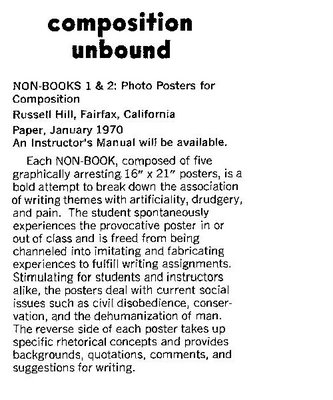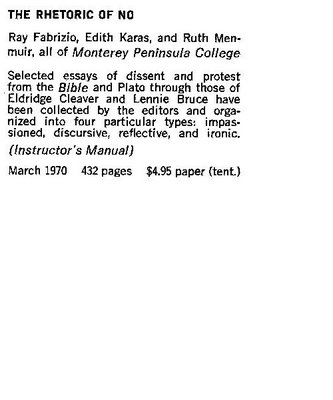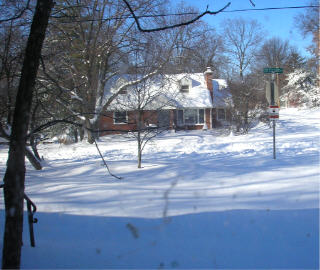I'm meeting up with G, a former colleague from SIU in a few, and I've got to get my stuff together for check out, but I thought I would take advantage of the beautiful internet connection in my huge room one last time. I just got back from the blogging panel with Michael Bérubé and Bitch PhD. I went to only one other panel, Collin's, the night I arrived. So I had a nice bookend of panels to my two days of conducting interviews. Other than that, I had the chance to spend some quality time with a few of my favorite bloggers, ran into a few of my former colleagues from a couple of different institutions, and will end with coffee and a ride to the airport with a member of my blogging class last spring. Not a bad way to spend a few days in Philadelphia at the end of the year.
And, in fact, I may not be a-blogging again until the next year. See you then.
Saturday, December 30, 2006
Wednesday, December 27, 2006
Big rooms and blogging changes
I'm in Philadelphia, at the Residence Inn, and I have a honking big room. It's bigger, I think, that some apartments I've lived in. With a kitchen and everything. And plates and pots for cooking and eating. If that's what I want to do while I'm here in Philadelphia.
I meant to blog this news this afternoon after arriving. But Blogger told me I needed to make the switch to the new (formerly the Beta) version of Blogger. And so I did. And that took awhile. In fact, it took so long I had fears of loosing everything. But now I'm all switched over. What's new? I'm not sure. I'll see if I can figure it out another day.
I meant to blog this news this afternoon after arriving. But Blogger told me I needed to make the switch to the new (formerly the Beta) version of Blogger. And so I did. And that took awhile. In fact, it took so long I had fears of loosing everything. But now I'm all switched over. What's new? I'm not sure. I'll see if I can figure it out another day.
Thursday, December 21, 2006
You know it's spam when
Well, there's the bit about the holidays being "a long period of time," and the strange compulsion to spell GERMANY in all caps:
So I guess I won't contact his personal secretary and claim my $435,000, for my nonspecific "past efforts." Nor will I let him know that I've received it, "so that we can share the joy after all the sufferness at that time." Indeed, the sufferness of that time would be all mine.
Peace to you all, in this long period of time.
Compliments of the season. It is really quite a long period of time. I have a good news for you at this festitude.
I am happy to inform you about my success in getting those funds transferred under the cooperation of a new partner from GERMANY. Presently Im in GERMANY for an investment projects with my own share of the total sum.
So I guess I won't contact his personal secretary and claim my $435,000, for my nonspecific "past efforts." Nor will I let him know that I've received it, "so that we can share the joy after all the sufferness at that time." Indeed, the sufferness of that time would be all mine.
Peace to you all, in this long period of time.
Monday, December 18, 2006
Traveling
Much traveling, in the past and future. Just got back from a weekend in Kansas City (maybe some pics to come). Will leave for Texas at the end of the week. And then to Philadelphia for the MLA.
More future travels: Blogger is now, at long last, trying to get me to switch over to the new beta thing. My fear: that my blog will be lost, even though I know Chris and others have successfully switched. Eventually they'll force the issue. So I will switch, or move to Word Press or something.
More future travels: Blogger is now, at long last, trying to get me to switch over to the new beta thing. My fear: that my blog will be lost, even though I know Chris and others have successfully switched. Eventually they'll force the issue. So I will switch, or move to Word Press or something.
Monday, December 11, 2006
Or, as he says, OT and IT
I was looking around on the web for stuff by my colleague John Miles Foley. He's in charge of so many things that he has a whole suite of offices in another building on campus--hence, I don't see him terribly often. But one of the things he's in charge of is the Center for E-Research, which sponsors faculty-student research fellowships and also brings speakers to campus.
He's also working on the "Pathways Project," which brings together (as the title of this entry suggests) OT (oral tradition) and IT (the internet). As the webpage for this project explains,
And, as I was looking around for more stuff he's done, I came across John Walter's blog entry from September, in which he talks about browsing Oral Tradition (the journal JMF edits) alongside Daniel Anderson's blog one day. He offers a nice oral-tradition-inflected reading of Dan's QuickTime movie called "Where I'm At," ending with this:
All of which makes me think: John (Walter, I mean)--maybe we should arrange some sort of symposium on just this thing while you're still in St. Louis. What do you say?
He's also working on the "Pathways Project," which brings together (as the title of this entry suggests) OT (oral tradition) and IT (the internet). As the webpage for this project explains,
The main subject of the Pathways Project is to illustrate and explain the fundamental similarities between humankind's oldest and newest thought-technologies: oral tradition and the internet. Despite superficial differences, both technologies are radically alike in depending not on static products but rather on continuous processes, not on "What?" but on "How do I get there?" In contrast to the spatial organization of the page and book, the technologies of oral tradition and the internet mime the way we think - by processing along pathways within a network. In both cases it's pathways - not things - that matter.
And, as I was looking around for more stuff he's done, I came across John Walter's blog entry from September, in which he talks about browsing Oral Tradition (the journal JMF edits) alongside Daniel Anderson's blog one day. He offers a nice oral-tradition-inflected reading of Dan's QuickTime movie called "Where I'm At," ending with this:
My point, however, is that once again I’m struck by how oral tradition studies and new media studies can speak to one another just as long as we’re willing to listen.
Almost as a meta comment to my own post, I want to point out that I decided to use the phrase “experience Dan’s performance” rather than using “watch” or “listen” to it. While we go to “see” plays and movies and while we “watch” television, for most of us, we’re listening as well as viewing the performance. We don’t have a term that includes both. People like Ong, working within the phenomenological tradition, have been dealing with issues like this for decades (see, for instance, “’I See What You Say’: Sense Analogues for Intellect.” Human Inquiries 10.1-3 (1970): 22-42; Rpt. in Interfaces of the Word: Studies in the Evolution of Consciousness and Culture. Ithaca: Cornell UP, 1977. 122-44), and yet we still don’t pay enough attention to these issues. Materiality and performance studies, while growing, are still largely niche specialties within both literary studies and rhetoric and composition. I’d love to seem more interaction and cross-disciplinary work taking place.
All of which makes me think: John (Walter, I mean)--maybe we should arrange some sort of symposium on just this thing while you're still in St. Louis. What do you say?
Sunday, December 10, 2006
MLAs I have known
I'm going to MLA, in a completely new capacity for me: I'm neither being interviewed (which is the usual reason I find myself at MLA), nor am I giving a paper (which I've done a couple of times). I'm going to MLA, totally on my department's nickel, because I'm on a search committee.
Since I wasn't sure what my schedule would be like before the interviews were set up, I hadn't even bothered to look at the program. I didn't want to find a panel that I really wanted to go to, and then end up not being able to go.
As it is, I'm not sure I'll be able to get to the big blogging panel Saturday morning, which I had heard about (via Collin), but I'm going to try. (And is that really Bitch PhD on the program? Somehow I had expected, when and if her true identity was finally revealed, to think--oh! so *that's* Bitch PhD! Of course! But I had no such moment. And, in retrospect, I'm not sure why I thought that.) And I'd like to make it to my colleague Elizabeth's panel on Saturday at 1:45 (because I think she's going to be talking about visual intertextuality in The League of Extraordinary Gentlemen, even though the title might not directly say that), but I think I might not have time to go to it and make my flight out of Philadelphia. And the interviewing schedule will make it impossible to make the big CCCC-sponsored panel on Thursday morning.
But, the good news is that I should be able to make it to Collin's panel on Wednesday. And I have open time around noon on both Thursday and Friday, so I can make it to the wiki panel Thursday. (Which combines my interest in wikis with my former passionate interest in language poetry!) As Collin notes, though, the wiki panel is at the same time as a panel on blogs with Michael Bérubé. So still can't do everything. But I can catch the panel with Katherine Hayles talking about "The Death of Postmodernism and the Rise of Informationalism" at noon on Friday.
I'll need to browse some more. But I'm happy to find that I'll be able to go to a few panels that promise to be interesting. I realize I'm going to reveal myself to be some sort of oddball here, but I have to admit that I actually like going to MLA. Because of my long and varied history in English, I have interests (like the one in language poetry) that I seldom get to to pursue. MLA offers me the opportunity to dip back into areas that still pull on me, and also to get to panels on rhetoric and such that often have better attendance than similar panels at CCCC. So MLA is ok with me. Call me crazy.
I also should have some time for socializing. So that's nice, too.
Since I wasn't sure what my schedule would be like before the interviews were set up, I hadn't even bothered to look at the program. I didn't want to find a panel that I really wanted to go to, and then end up not being able to go.
As it is, I'm not sure I'll be able to get to the big blogging panel Saturday morning, which I had heard about (via Collin), but I'm going to try. (And is that really Bitch PhD on the program? Somehow I had expected, when and if her true identity was finally revealed, to think--oh! so *that's* Bitch PhD! Of course! But I had no such moment. And, in retrospect, I'm not sure why I thought that.) And I'd like to make it to my colleague Elizabeth's panel on Saturday at 1:45 (because I think she's going to be talking about visual intertextuality in The League of Extraordinary Gentlemen, even though the title might not directly say that), but I think I might not have time to go to it and make my flight out of Philadelphia. And the interviewing schedule will make it impossible to make the big CCCC-sponsored panel on Thursday morning.
But, the good news is that I should be able to make it to Collin's panel on Wednesday. And I have open time around noon on both Thursday and Friday, so I can make it to the wiki panel Thursday. (Which combines my interest in wikis with my former passionate interest in language poetry!) As Collin notes, though, the wiki panel is at the same time as a panel on blogs with Michael Bérubé. So still can't do everything. But I can catch the panel with Katherine Hayles talking about "The Death of Postmodernism and the Rise of Informationalism" at noon on Friday.
I'll need to browse some more. But I'm happy to find that I'll be able to go to a few panels that promise to be interesting. I realize I'm going to reveal myself to be some sort of oddball here, but I have to admit that I actually like going to MLA. Because of my long and varied history in English, I have interests (like the one in language poetry) that I seldom get to to pursue. MLA offers me the opportunity to dip back into areas that still pull on me, and also to get to panels on rhetoric and such that often have better attendance than similar panels at CCCC. So MLA is ok with me. Call me crazy.
I also should have some time for socializing. So that's nice, too.
Thursday, December 07, 2006
Composition, 1970 style

I'm browsing issues of CCC from 1970. Some of the best parts are the ads. It's easy to see why Sirc has a certain nostalgia for late-60s composition. Textbooks called "The Rhetoric of No" and "NON-BOOKs." Something happened around 1975 or so. (And that's the topic of a chapter I'm working on right about now.)
The ads themselves:


Monday, December 04, 2006
Buying software
So let's say you did a week-long workshop on teaching with technology. For your participation, you're given $500 to spend on any computer software, etc. And let's say you're most interested in Web 2.0 things. Should you buy some good wiki software? Or what? What in the world should you buy?
It isn't that you can't think of things. It's just that there are so many things.
What would *you* buy?
It isn't that you can't think of things. It's just that there are so many things.
What would *you* buy?
Saturday, December 02, 2006
More with the crowds
Jeff's post on The Wisdom of Crowds prompted me to do a little internet searching to glean some more information about this book and its basic idea.
And going to Google, of course, is itself an example of trusting to the wisdom of crowds, trusting that in the aggregate of that information gathering I'll find a range of opinions, the average of which will give me the best opinion. (Amazon rankings, too, are an example of this wisdom, I would say, and the average rating for the book itself is four stars. Pretty good.)
Jeff's post interested me for at least a couple of reasons. For one, the idea of crowd wisdom connects up with Google rankings and the circulation of information, something I've been thinking about, and something that Jenny talks about at greater length.
Another reason has to do with what I allude to in the comments on Jeff's blog. I don't want to get specific here, and it isn't really anything that specific, it's just noticing what happens at meetings and being somewhat mystified. I would say that two problems I've noticed in various settings is (1) too much centralized control, and (2) not enough diversity of information. For crowds to be wise, according to the book, you need to have decentralized decision-making and a diversity of information.
And a third reason (taking me beyond a couple) that just comes to me as I'm thinking about this is something that's been rattling around for me since reading the WPA-L archives from a few years back. I was looking for the thread that "responded" to the summary of one of Bousquet's piece from the Chronicle. (That is, the Chronicle summarized an article of Bousquet's. The prepositional phrases in that sentence got out of hand.) While searching, I came across another thread about a certain writing program, and was especially taken by something Jeff wrote there, noting the diversity of approaches and commitment to pedagogy exhibited by TAs at his PhD program. And I was wondering how one might duplicate that, how to get a program where there is a real investment in intelligent, innovative pedagogy. Clearly, prescribed syllabi aren't going to do it (and we don't have prescribed syllabi here). But just pure laissez-faire doesn't seem to quite do it, either. Seems like what's missing in the latter approach is aggregation? So maybe a good role for the WPA would be something like that? Aggregator in chief?
Just thinking.
And going to Google, of course, is itself an example of trusting to the wisdom of crowds, trusting that in the aggregate of that information gathering I'll find a range of opinions, the average of which will give me the best opinion. (Amazon rankings, too, are an example of this wisdom, I would say, and the average rating for the book itself is four stars. Pretty good.)
Jeff's post interested me for at least a couple of reasons. For one, the idea of crowd wisdom connects up with Google rankings and the circulation of information, something I've been thinking about, and something that Jenny talks about at greater length.
Another reason has to do with what I allude to in the comments on Jeff's blog. I don't want to get specific here, and it isn't really anything that specific, it's just noticing what happens at meetings and being somewhat mystified. I would say that two problems I've noticed in various settings is (1) too much centralized control, and (2) not enough diversity of information. For crowds to be wise, according to the book, you need to have decentralized decision-making and a diversity of information.
And a third reason (taking me beyond a couple) that just comes to me as I'm thinking about this is something that's been rattling around for me since reading the WPA-L archives from a few years back. I was looking for the thread that "responded" to the summary of one of Bousquet's piece from the Chronicle. (That is, the Chronicle summarized an article of Bousquet's. The prepositional phrases in that sentence got out of hand.) While searching, I came across another thread about a certain writing program, and was especially taken by something Jeff wrote there, noting the diversity of approaches and commitment to pedagogy exhibited by TAs at his PhD program. And I was wondering how one might duplicate that, how to get a program where there is a real investment in intelligent, innovative pedagogy. Clearly, prescribed syllabi aren't going to do it (and we don't have prescribed syllabi here). But just pure laissez-faire doesn't seem to quite do it, either. Seems like what's missing in the latter approach is aggregation? So maybe a good role for the WPA would be something like that? Aggregator in chief?
Just thinking.
Friday, December 01, 2006
White out
The view from my front door (photo courtesy of C):

Somewhere in there, there's my yard, the street, and the neighbor's yard. Somewhere.
Says the Columbia Daily Tribune:
Oh, and there's this:
I was just complaining over at Billie's blog that I never get snow days like I did when I was growing up in Texas and any snow or ice fall was a major event. And now I get a snow day, but there's a small complication. I'm ON LEAVE! So, who cares that classes are cancelled? In fact, it's slightly annoying. I can't go anywhere. The roads are impassible. (Although I do see some tire tunnels in front of the house now, so someone got through.) What if I need to go to the store? What if I have a medical emergency?
Ah well. Keep warm out there.

Somewhere in there, there's my yard, the street, and the neighbor's yard. Somewhere.
Says the Columbia Daily Tribune:
Old Man Winter dumped between a foot and 15½ inches of snow on Columbia in a 24-hour period, making this year the second most significant snowfall since 1900.
Oh, and there's this:
Today’s snowfall has essentially shut down the city. Emergency officials are urging residents to stay home. The University of Missouri-Columbia called off classes today for the first time since 1995.
I was just complaining over at Billie's blog that I never get snow days like I did when I was growing up in Texas and any snow or ice fall was a major event. And now I get a snow day, but there's a small complication. I'm ON LEAVE! So, who cares that classes are cancelled? In fact, it's slightly annoying. I can't go anywhere. The roads are impassible. (Although I do see some tire tunnels in front of the house now, so someone got through.) What if I need to go to the store? What if I have a medical emergency?
Ah well. Keep warm out there.
Subscribe to:
Posts (Atom)
